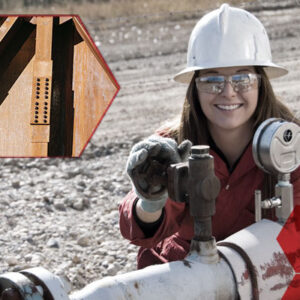A professional’s guide to becoming a Basic Coatings Inspector.

A coatings corrosion inspector is a professional who is responsible for inspecting and evaluating the quality of protective coatings applied to various surfaces, structures, and equipment to prevent corrosion. They play a critical role in ensuring the safety, reliability, and longevity of industrial, commercial, and private assets. Industries such as oil and gas, petrochemical, marine, aerospace, transportation, construction, and more are prone to environmental damage and must be protected from corrosion.
What is the role of a coatings inspector, and who is it for?

An introductory coatings inspector course is helpful for Project managers, supervisors/forepersons and engineers, Maintenance and quality assurance/control (QA/QC) personnel, Contractors and specification writers, Coating manufacturers and technical sales representatives, Fabricators and welders, Paint applicators and blasters. This course brings additional knowledge to the field and adds value to their careers. This course is also a first step to becoming a senior certified coatings Inspector. These professionals are recognised as the leaders in the field of Coatings Inspection.
Many professionals such as Painters, Paint salespeople, Engineers, Consultants and Managers get a coating inspector certification to gain additional knowledge, learn more about protective coatings and add value to their careers. However, their primary role is not in Quality Assurance of the coatings, though the knowledge is a valuable addition to their core skillset.

A coating inspector’s primary role is to check if the work performed meets the required specifications of the project and complies with all the regulatory and documentary specifications. It is important to note that as a professional coating inspector, you should ensure that the coatings work is strictly in accordance with the project requirements and documentation. Any changes should only be made after discussions with the owner or the engineer of the project.
The most important aspect to remember for individuals looking to make a profession as a coatings inspector is that the new AMPP Coatings Inspector Program will eventually replace NACE CIP and SSPC PCI in standards and requirements.
Obtain Required Certifications
The new AMPP Coatings Inspector Program offers a host of excellent industry-certified programs from NACE and SSPC. The program offers a solid foundation to become a senior inspector in the industry with extensive study material combined with classroom study, discussions and hands-on practice.
Enrol for the Basic Coatings Inspector / CIP Level 1 Certification available at CORCON Institute of Corrosion, which is the official licensee for education and certification programs for NACE International in India. NACEs programs are carefully designed to support the goals of individuals new to the industry and senior-level managers.
The first step to becoming a Basic Coatings Inspector is to obtain the necessary certifications. Completing the Coating Inspector Program (CIP) Level 1 Course is the first step to earning the Basic Coatings Inspector Certification. The CIP Level 1 Course provides entry-level knowledge of basic coating materials used in various industries and surfaces, techniques for preparing the surface for the application of anti-rust coatings and the different application processes used in the industry.

You will also gain basic knowledge of the industry’s inspection testing and documentation processes. The course is designed for coating inspector trainees but benefits anyone interested in gaining a better understanding of coatings and inspection.
The certification process also involves taking the Basic Coating Inspector Practical exam administered in the classroom and the Basic Coating Inspector Written Exam NACE-CIP1-001 scheduled through Pearson VUE. Additionally, one must complete the Ethics for the Corrosion Professional course or equivalent training and agree to AMPP’s terms of service.
To apply for certification, candidates must have at least four years to complete all requirements, including successful exam completion and an approved application with the required work experience and education requirements.
After successfully obtaining the Basic Coatings Inspector certification, you can perform essential coating inspections on steel substrates using non-destructive testing and instrumentation.
Stay Up to Date with Codes and Standards.
The AMPP Coating Inspector Code of Conduct is a set of ethical and professional guidelines by which all coating inspectors in any given industry that uses coatings to prevent rust and corrosion abide. This Code of conduct has a list of the best practices for professionals in inspection, assessment and quality control. It also lists the generally expected behaviour and responsibilities to be followed by coating inspectors. Finally, it also mentions the duties of the inspectors regarding their role in maintaining the safety, quality and integrity of coating projects.
The Code of conduct covers topics such as confidentiality, impartiality, conflict of interest, professional competence, safety, the integrity of coatings projects and more for all coating inspectors. This is to maintain a high level of professionalism, ethics and technical know-how in the industry.
Some of the few topics covered in the Code of conduct include
Professionalism: Coating inspectors are expected to conduct themselves professionally at all times and respect the rights of all individuals they work with.
Impartiality: Coating inspectors are expected to maintain an objective and unbiased approach to their work, avoid conflicts of interest and ensure complete fairness in their work.

Confidentiality: Coating inspectors are required to maintain the confidentiality of all proprietary and confidential information they may come across in the course of their work and make sure that they do not pass on proprietary information to others consciously or otherwise.
Technical competence: Coating inspectors are expected to maintain their technical expertise and knowledge of industry standards, regulations, and best practices through constant upgradation and networking with the professionals in the industry. It is crucial to be aware of the changes to codes and standards due to the development of new technology and how they affect the inspection process.
Safety: Coating inspectors are responsible for ensuring that coating projects are completed safely and securely, with due regard to the health and safety of all personnel involved. Corrosion affects all industries, and the coatings inspectors must ensure that all projects are completed according to the prescribed technical specifications.
This Code of conduct is important as it serves as a guide for coating professionals and covers different aspects of coating inspection, surface preparation, coating application inspection techniques and evaluation.
Learn Best Practices for Equipment Use and Safety.
The coating industry involves the preparation of surfaces to be coated with abrasive blasting equipment and the removal of older or previous coatings. Further, the coatings to be applied can be inflammable or poisonous. Therefore, it is crucial to be aware of the properties of the materials to be used and take necessary precautions. Some of the necessary steps to be taken may include wearing appropriate personal protective equipment (PPE) to protect against fumes, dust and sprays. In addition, inspectors must be aware of the risks and hazards associated with the equipment and use it safely to prevent accidents and injuries.
Steps to prevent accidental fire or explosion of flammable materials must be incorporated. This may include setting up rules and regulations regarding its use in spaces containing open flames, incorporation of no-smoking zones in areas of storage, use and transport, proper ventilation, regular checks and audits to maintain guidelines and regular training to all personnel. As a coatings inspector, you will require to have complete knowledge of the equipment to be used, the kinds of coatings and their properties, and the safety precautions that are required to be used in various processes and surfaces. The manufacturer’s guidelines for the use of equipment should be deeply understood and as well as the immediate steps to be followed in case of emergencies.
Inspect Surfaces and Materials to Establish Adherence to Specifications.
Inspection of surfaces and materials and establishing adherence to specifications is a primary prerequisite before any preventive coating application. You will need to conduct a thorough inspection of the condition of the surface to be coated and understand the coating systems to be applied and their properties. Determination of original rust and paint that has been removed, if any, and Surface cleaning for visible and invisible contaminants in the form of salts.
Some of the key factors that lead to coating failure are
Inadequate surface preparation: Surface preparation is essential as it determines how well the coating s sticks to the surface being painted.
Humidity and Environmental Conditions: Measuring relative humidity and dew point during the work process is extremely important as most coating failures occur due to the application of coatings when the climatic conditions are not appropriate. So it is vital to ensure that the climatic conditions are within the recommended specifications.
Record Results and Submit Reports as Required by the Contractor or Client.
As a coatings inspector, it’s your responsibility to accurately document and report your inspection results in the required format as requested by the contractor or client. These reports may need to be submitted daily or weekly as per the contract specifications. Your daily reports should include all relevant details, such as the environmental conditions, surface preparation, equipment used, location of inspection, and any deviations observed during the inspection.
In case of any failures, these daily reports are of significant importance as they provide failure analysis and play a critical role in arbitration. In addition, some of the essential inspection documentation required includes precise and complete inspection records, all relevant information for management, verification of contractor’s work, and details of non-confirming work.
Your accurate and thorough documentation is vital for the contractor or client to make informed decisions about the coating system’s performance. While recording results, ensure to include all relevant information such as the date, time, location, equipment, materials used, and specific conditions observed. Note any deviations from the specifications and document any concerns you may have.

Submitting reports may involve preparing written reports, completing checklists or forms, or using specialised software. Your reports should be clear, concise, and well-organised, providing a comprehensive summary of your findings. Communicate any issues or concerns promptly to ensure corrective action can be taken promptly.
Effective record-keeping and reporting are critical for maintaining quality control and ensuring that coating systems meet the necessary specifications and standards. As a coatings inspector, you will play a crucial role in this process, and your attention to detail and accuracy will be crucial for the project’s success.
To summarise, a coatings inspector plays an essential role in the safety and reliability of the life of assets that are critical for industries. They should be individuals with high integrity who have a deep understanding of industry standards and procedures, along with excellent communication and collaborations skills.
Image Reference: Freepik
Disclaimer: All trademarks, logos, and brand names are the property of their respective owners. All company, product, and service names used in this website are for identification purposes only. Use of these names, trademarks, and brands does not imply endorsement.

